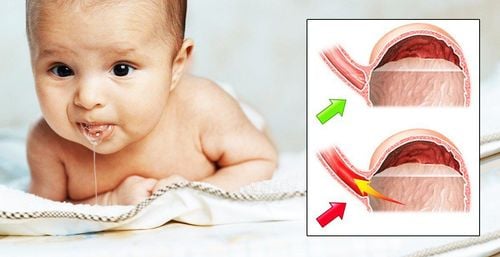This is an automatically translated article.
Vomiting is a condition that many children have and has many causes that make parents worry about whether this child has gastroesophageal reflux or not to adjust the nutrition for children with vomiting. suitable.
1. What is a child who vomits or vomits?
Vomiting is a condition in which food from the stomach is contracted by the diaphragm and abdominal muscles, pushed up into the esophagus and out through the mouth. Children who vomit often will often cry, uncomfortable due to abdominal pain, fatigue, thereby affecting the absorption of nutrients of children, weight loss can damage the digestive system, causing anorexia mentality, ...

Trẻ hay nôn trớ gây sụt cân, biếng ăn
2. What causes children to vomit?
There are many reasons why children often vomit. In infants with immature digestive systems, babies are prone to vomiting in the first few months. However, as the child grows older and the digestive system matures, this condition will go away on its own. In addition, vomiting is also caused by the following reasons:
Due to eating: Children are too full or eat too much, improper bottle feeding causes children to swallow a lot of gas in the abdomen, food poisoning, cow's milk allergy, baby lying down immediately after feeding or eating. Due to autonomic disorders: Children who often vomit due to autonomic disorders will often appear in the first days after birth, or when the baby is breastfed or formula fed. Children often vomit during or after eating, however, vomiting little or no weight loss. Due to diseases: Some acute bacterial infections such as pneumonia, pharyngitis, tonsillitis, meningitis, diarrhea, ... Digestive diseases such as gastroesophageal reflux, intestinal obstruction, intussusception,... Or children suffering from malnutrition, rickets, constipation. Due to congenital malformations: Hypertrophic pyloric stenosis is a congenital malformation that usually appears in children aged 2 months with the manifestation of vomiting a lot and vomiting continuously, thus making the child tired, malnourished, anemic. slow weight gain. In addition, due to a number of other malformations such as esophageal stricture or isthmus, ...

Trẻ hay nôn trớ phải làm sao?
3. Nutritional care for children with vomiting
Children vomit what to eat to stop vomiting and make up for lost food is a question of many parents. However, before feeding the child again, parents need to replenish the body's lost water when the child vomits, especially when vomiting a lot. Parents can give the child water, fruit juice or Oresol electrolyte rehydration solution with specific time and dosage:
After the child stops vomiting, give the child water or electrolytes in a small amount. at intervals of 30 - 60 minutes repeat. If the child is still vomiting, give the child 50ml of water mixed with oresol in turn, then after 30 minutes, give the child 50ml of filtered water, and repeat. If the child's vomiting stops completely, the child can be breastfed again, or drink milk from a cup with an increasing amount from 80-100ml every 3-4 hours. After 12-24 hours, if the child no longer vomits, the parents should start feeding the child again. Accordingly, nutritional care for children with vomiting should pay attention to the following:
Feed children into many meals a day and reduce the amount of food in each meal. For children over 6 months old and starting to eat solid foods, they should give them solid foods compared to breast milk. Feed your child easily digestible foods such as yogurt and cereals. After eating, avoid lying down immediately. Add water for children when they start to eat solids. Children often vomit is a common condition. Vomiting has many causes and depending on the treatment will be different. For children who often vomit, parents need to pay attention to giving children rehydration, milk and prioritize foods that are easy to digest.
Although vomiting is a condition many children suffer from, parents should not be subjective but need to find a way to handle it, if in the case of a child vomiting for a long time, it may be a sign of some diseases of the digestive tract. chemical. Therefore, mothers should take their children to hospitals and health centers with specialties in pediatrics - gastroenterology for examination and treatment, minimizing the risk of complications.
In Vietnam today, 7 out of 10 children under 5 years old have zinc deficiency and 8 pregnant women have zinc deficiency. The prevalence of zinc deficiency in pregnant women is 80.3%, women of childbearing age 63.6% and children under 5 years old is 69.4%. The most common manifestations of zinc deficiency in children are growth retardation, mild and moderate malnutrition, delayed growth in height, and some observable symptoms such as anorexia or decreased appetite, decreased suckling, and no meat. fish, slow digestion, mild constipation, persistent nausea and vomiting in children. In addition to reasonable zinc supplementation, parents also need to provide their children with other important vitamins and minerals such as lysine, chromium, B vitamins,... resistance to less minor illnesses and less digestive problems.
Please visit the website vimec.com regularly and update useful information to take care of your baby and family.













